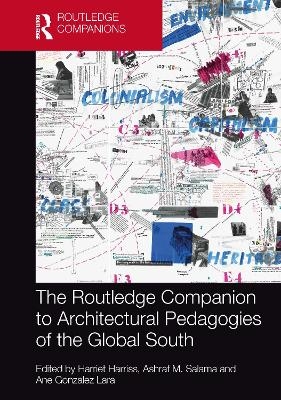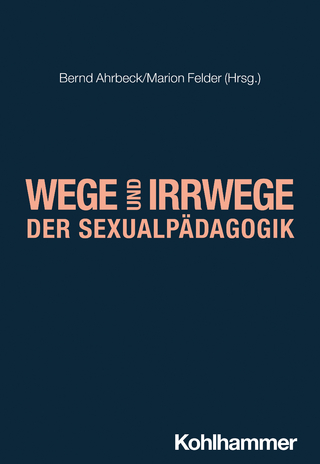
The Routledge Companion to Architectural Pedagogies of the Global South
Routledge (Verlag)
978-1-032-32924-6 (ISBN)
The established canon of architectural pedagogy has been predominantly produced within the Northern hemisphere and transposed – or imposed – across schools within the Global South, more often, with scant regard for social, economic, political or ecological culture and context, nor regional or indigenous pedagogic principles and practices. Throughout the Global South, architecture’s academic community has been deeply affected by this regime, how it shapes and influences proto-professionals and by implication architectural processes and outcomes, too.
The Routledge Companion to Architectural Pedagogies of the Global South resituates and recenters an array of pedagogic approaches that are either produced or proliferate from the ‘Global South’ while antagonizing the linguistic, epistemological and disciplinary conceits that, under imperialist imperatives, ensured that these pedagogies remained maligned or marginalized. The book maintains that the exclusionary implications of architectural notions of the ‘orders’, the ‘canon’ and the ‘core’ have served to constrain and to calcify its contents and in doing so, imperiled its relevance and impact. In contrast, this companion of pedagogic approaches serves to evidence that architecture’s academic and professional advancement is wholly contingent on its ability to fully engage in an additive and inclusive process whereby the necessary disruptions that occur when marginalized knowledge confronts established knowledge result in a catalytical transformation through which new, co-created knowledge can emerge. Notions of tradition, identity, modernity, vernacularism, post-colonialism, poverty, migration, social and spatial justice, climate apartheid, globalization, ethical standards and international partnerships are key considerations in the context of the Global South. How these issues originate and evolve within architectural schools and curricula and how they act as drivers across all curricula activities are some of the important themes that the contributors interrogate and debate.
With more than 30 contributions from 55 authors from diverse regional, racial, ethnic, gender and cultural backgrounds, this companion is structured in four sections that capture, critique and catalog multifarious marginalized pedagogical approaches to provide educators and students with an essential source book of navigational steers, core contestations, propositional tactics and reimagined rubrics. The Routledge Companion to Architectural Pedagogies of the Global South pioneers a transposable strategy for academics from all disciplines looking to adopt a tested approach to decolonizing the curriculum. It is only through a process of destabilizing the hegemonic, epistemological and disciplinary frameworks that have long-prescribed architecture’s pedagogies that the possibility of more inclusive, representative and relevant pedagogical practices can emerge.
Dr. Harriet Harriss (RIBA, PFHEA, Ph.D., FRSA) is an award-winning educator, qualified architect, and the former Dean of the Pratt School of Architecture in Brooklyn. Her teaching, research, and writing focus on pioneering pedagogic models for design education and exploring the intersectional edge of social justice and the climate crisis theories and practices, themes that emerged from two of her highly-regarded texts, Radical Pedagogies: Architectural Education & the British Tradition (2015) and A Gendered Profession (2016). Dr. Harriss’ advocacy for diversity and inclusion within design education was further recognized by Dezeen Magazine, which identified Dean Harriss as one of the Top Ten Champions for Women in Architecture and Design in 2019. Her publication, Architects After Architecture (2020), won the Annual Bates Prize for Architectural Media. Her recent and forthcoming publications include Greta Magnusson Grossman - Modern Design from Sweden to California (2021), Working at the Intersection: The Architecture of the Post-Anthropocene (2022)100 Women Architects (2023), Architectures Afterlife (2023) and The Routledge Companion to Architectural Pedagogies of the Global South (2023). Combined, these texts extrapolate upon her growing expertise in archival activism, climate crisis curriculum, and diversity, equity, and inclusion. In her own words, Dr. Harriss argues that there can be ‘no climate justice without climate justice’ and that ‘the co-creation of a climate crisis curriculum is the most pressing imperative facing architectural education and practice.’ Ashraf M. Salama (FRSA, FHEA, PhD) is a Full Professor in Architecture and the Head of the School of Architecture and Built Environment, University of Northumbria, Newcastle upon Tyne, UK. He has led three schools of architecture in Egypt, Qatar and the UK, two of which he has founded, and was the Head of the School of Architecture at the University of Strathclyde, UK (2014–2020). With experience spanning across many contexts, he was the Director of research and consulting at Adams Group Architects in Charlotte, NC. Ashraf has published 14 authored and edited books, including Demystifying Doha (2013), Architecture Beyond Criticism (2014), Spatial Design Education (2015), Building Migrant Cities in the Gulf (2019), Architectural Excellence in Islamic Societies (2020) and Transformative Pedagogy in Architecture and Urbanism (2021). He is the UIA 2017 recipient of Jean Tschumi Prize for Excellence in Architectural Education and Criticism. Ane Gonzalez Lara is an Assistant Professor of undergraduate Architecture at Pratt Institute School of Architecture and a registered Architect in Texas and Spain. Ane is the co-founder of Idyll Studio, balancing in her professional work social and cultural concerns with extensive formal and material research. As part of her studio teachings, she has developed academic research initiatives that have examined the United States-Mexican border and the Korean demilitarized zone. Ane received her Master-equivalent degree from the Escuela Tecnica Superior de Arquitectura, Navarra, Spain. Prior to working at Pratt, she taught at the University of New Mexico and the University of Houston. Ane's research interests include pedagogy and social and climate justice topics as they relate to the built environment.
Introduction Section 1: Theories, Tools and Terms of Engagement Section 2: Challenging Canons, Co-Creating Curricula Section 3: The Pedagogical Is Political Section 4: Hybrid Hermeneutics Index
| Erscheinungsdatum | 05.10.2022 |
|---|---|
| Reihe/Serie | Routledge International Handbooks |
| Zusatzinfo | 11 Tables, black and white; 21 Line drawings, black and white; 154 Halftones, black and white; 175 Illustrations, black and white |
| Verlagsort | London |
| Sprache | englisch |
| Maße | 174 x 246 mm |
| Gewicht | 940 g |
| Themenwelt | Sozialwissenschaften ► Pädagogik |
| Technik ► Architektur | |
| ISBN-10 | 1-032-32924-6 / 1032329246 |
| ISBN-13 | 978-1-032-32924-6 / 9781032329246 |
| Zustand | Neuware |
| Informationen gemäß Produktsicherheitsverordnung (GPSR) | |
| Haben Sie eine Frage zum Produkt? |
aus dem Bereich


